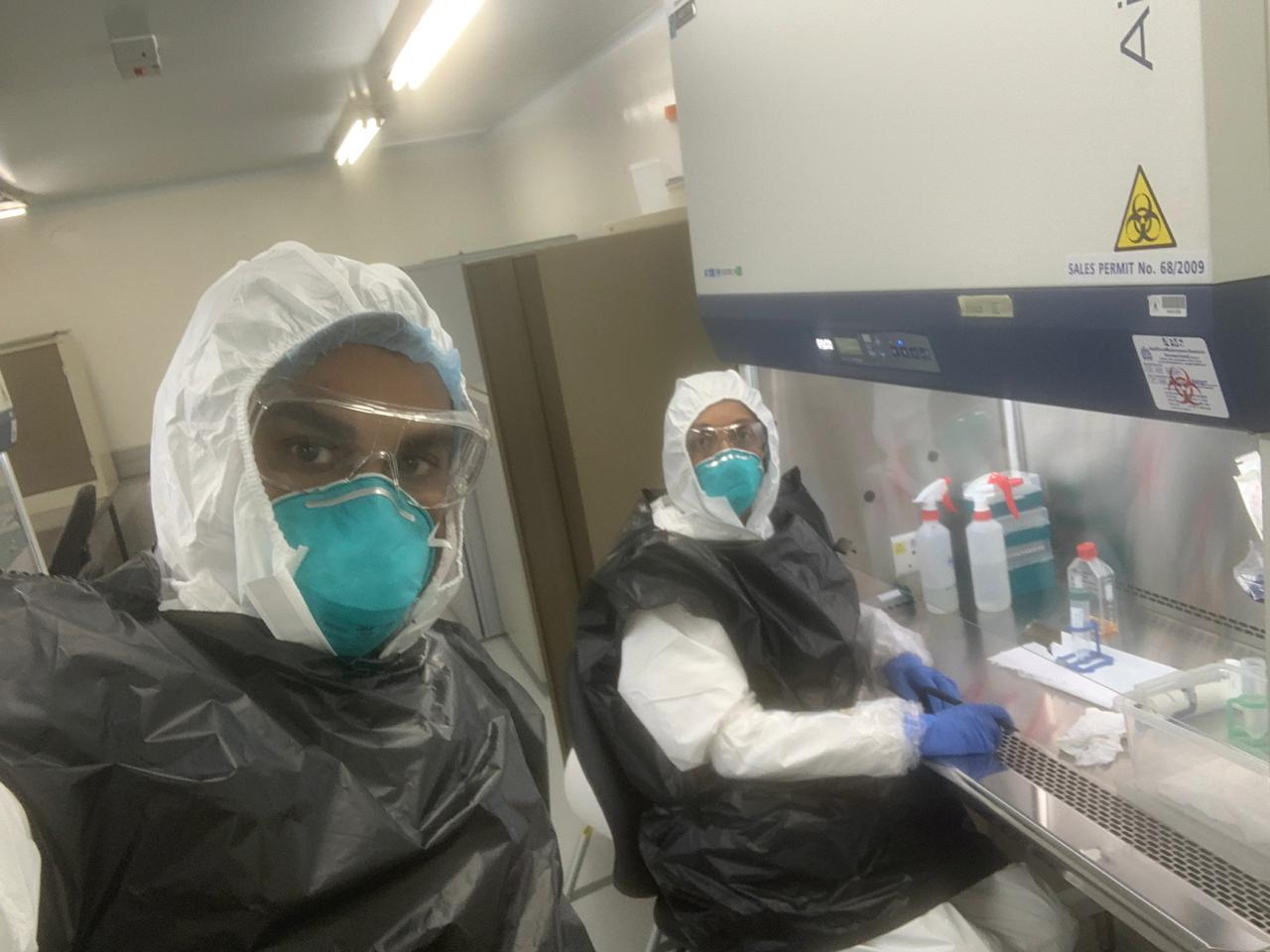SAMRC’S Emerging Science Leaders Harvest Live Coronavirus
 Cape Town | The South African Medical Research Council (SAMRC) is home to some of the country’s leading scientists. With the outbreak of the Covid-19 pandemic, science is at the forefront of responding to one of the worst threats to human life since the Spanish Flu, which affected an estimated 500 million people worldwide. Professor Bavesh Kana and Dr Bhavna Gordhan, both recipients of the SAMRC Career Development Award, have harvested live coronavirus as an additional control for validating tests.
Cape Town | The South African Medical Research Council (SAMRC) is home to some of the country’s leading scientists. With the outbreak of the Covid-19 pandemic, science is at the forefront of responding to one of the worst threats to human life since the Spanish Flu, which affected an estimated 500 million people worldwide. Professor Bavesh Kana and Dr Bhavna Gordhan, both recipients of the SAMRC Career Development Award, have harvested live coronavirus as an additional control for validating tests.
Until recently, Prof Kana and his team have been able to successfully generate naked DNA and safe, non-infectious encapsulated controls. The remaining hurdle was the production of the live virus as an additional control for validating tests.
The process involved multiple teams across institutions: Professor Maria Papathanasopoulos and her team comprising Mark Killick and Adriaan Basson (Wits University), they generated the cultured cells required to propagate the virus. Professor Wolfgang Preiser (Stellenbosch University) and Tasnim Suliman (University of the Western Cape), were able to provide the aliquots (a sample for chemical/biological analysis) of the live SARS-CoV-2 virus, the virus that causes COVID-19 disease. Once these reagents were ready, they were taken into the BSL3 lab, led by Prof Kana, for infection and viral propagation. The first harvest of the virus was then provided to Professor Lesley Scott and Lara Noble at Wits University and the National Health Laboratory Service (NHLS) for validation of test kits.
“My hand was shaking as we pipetted our first harvest of the live virus,” said Professor Kana, who heads the Wits University node of the DST/NRF Centre of Excellence for Biomedical TB Research. Kana is no stranger to handling infectious viruses, he has been in laboratories containing the infectious anthrax virus. But this felt like a defining moment as plans to prepare for the validation of new Covid-19 polymerase chain reaction and serology diagnostic kits intensify.
Professor Kana’s BSL3 lab was originally part of the SAMRC/NHLS/Wits Molecular Mycobacteriology Research Unit. At the time these labs were established, setting up BSL3 labs was challenging as there were not many such laboratories in the country that could be modelled. They relied on information gathered from limited exposure to the BSL3 laboratories at Glaxo-SmithKline and the London School of Hygiene and Tropical Medicine in the UK. However, as they did not share the same infrastructure and financial resources, most of it was based on brainstorming and adapting for safe practice. Much has changed since then. “We were able to quickly respond to the Covid-19 pandemic and adapt a BSL3 laboratory geared for dealing with infectious bacteria to carry out work with a highly infectious virus,” said Dr Bhavna Gordhan, Senior Medical Scientist at the Biomedical TB Research Centre.
Kana a recipient of the SAMRC Silver Medal awarded to scientists who have made important scientific contributions in the country, says over the years, numerous funders have played important roles in enabling him to develop both the staff and infrastructure capacity for this moment. Both Kana and Gordhan were recipients of the SAMRC Career Development Award for two terms, they were grantees through the SAMRC’s Strategic Health Innovation Partnerships (SHIP) programme. Gordhan’s postdoctoral studies were under the Glaxo-SmithKline Action TB program facilitated by the SAMRC, where she developed several molecular tools for studying the bacteria that cause tuberculosis.
“Many of my students have held scholarships through the SAMRC’s Research Capacity Development division. Further, during my early career, I was generously supported by the SAMRC’s extramural Molecular Mycobacteriology Research Unit led by Valerie Mizrahi,” said Kana.
This is a great feat for the SAMRC, the scientific community and country, it demonstrates our commitment of growing the next generation of science leaders, it is responsive science addressing the Covid-19 crisis” said Professor Glenda Gray SAMRC President and CEO.
NOTE TO THE EDITOR:
The SAMRC is dedicated to improving the health of people in South Africa, through research, innovation, development and technology transfer. The scope of research includes laboratory investigations, clinical research, and public health studies.
The Research Capacity Development division of the SAMRC supports the growth of health research capacity by offering scholarships and grants to South African citizens who are pursuing their research careers in medical and health Sciences.

